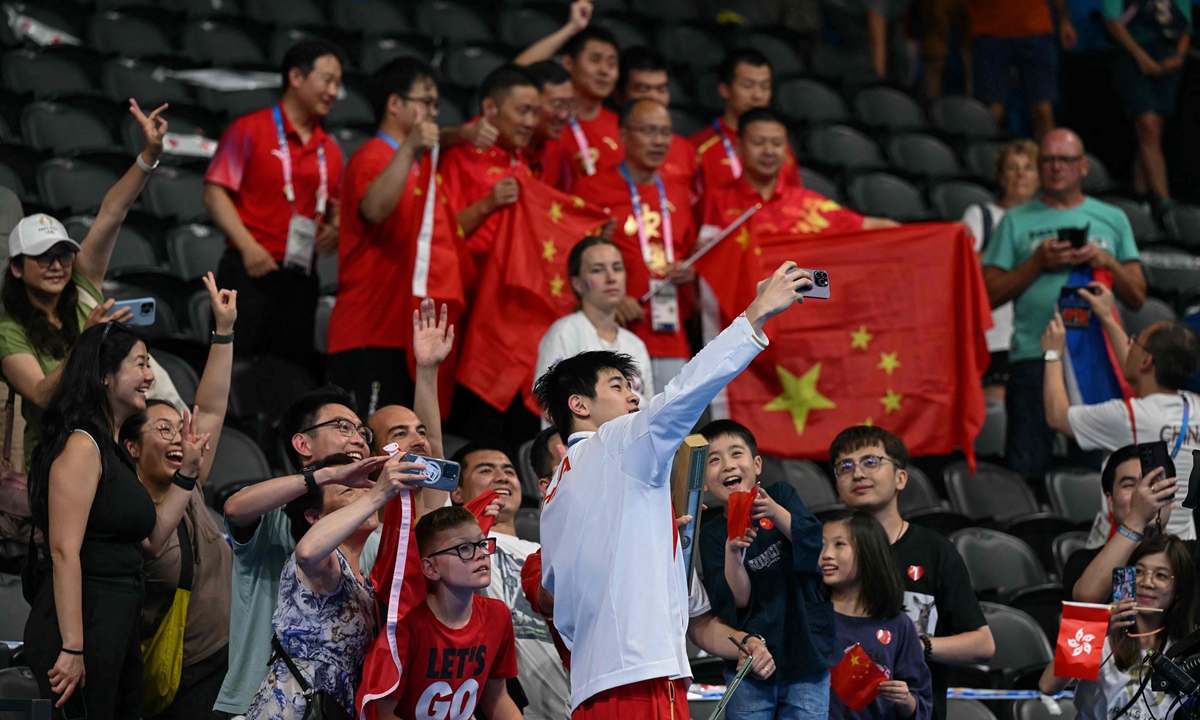
Gold medallist Pan Zhanle takes a selfie with supporters following the men's 100-meter freestyle swimming event at the Paris Olympic Games on July 31, 2024. Photo: VCG
The phrase "innocent until proven guilty" is a universally accepted presumption that anyone suspected of a crime should be considered innocent without sufficient solid, concrete evidence to support the charges.
However, when the "accused" is China, this golden rule is often changed by some forces in the West, to "guilty even when proven innocent," and, without any proof, they still continue to attack China.
One of the latest victims is the Chinese swim team at the Paris 2024 Olympics. Throughout this year's Games, Chinese swimmers are nearly drowning in endless doping tests, unwarranted suspicion from some of their Western counterparts and hostile attacks, mainly from US politicians and media.
On Monday, the Chinese swim team finished the Paris Olympics with two gold, three silver and seven bronze medals, doubling its haul from the Tokyo Olympics. This is a thrilling triumph for Team China, considering the overwhelming external pressure these young athletes faced from Western public opinion.
The Chinese swim team was the most tested at the Paris Olympics, with the Chinese swimmers having been tested more than 600 times this year. So far, none of the Chinese medalists of this year's Games has tested positive. However, doubts and attacks keep coming. Where is the spirit of the presumption of innocence? Why has China been automatically excluded when it comes to this rule?
Of course, it is the people who choose when to use this phrase.
According to the logic of some Westerners, China cannot and must not win. They believe that the success of Chinese swimmers "makes no sense" because how could a Chinese athlete so easily outperform his or her Western counterparts? Brett Hawke, a former Australian Olympic swimmer and coach complained that Chinese swimmer Pan Zhanle's world-record swim in the 100m freestyle final was "not humanly possible." British triple Olympic gold medalist Adam Peaty called for stricter doping testing, claiming "there's no point in winning if you don't win fairly." They assumed that in a sport dominated by the West, if China wins, it must have cheated.
While they may argue that their doubts are justified, will they apply the same skepticism to medalists from the US, a country where 90 percent of athletes don't even compete under the World Anti-Doping Code? Based on current observations, it seems unlikely. Selective doubt will continue to dominate Western public opinion in the Olympics.
At the core of these doubts lies a rejection of China's rapid development in various fields. The continuous improvement of economic and health conditions in society, as well as advancements in education and sports training, have allowed Chinese athletes to reach their full potential and achieve impressive results in various global competitions over the years.
The success of the Chinese swim team at this year's Olympic Games should serve as a wake-up call to some arrogant and complacent Westerners: The world cannot be permanently dominated by the West. This is a harsh new reality that some in that part of the world need to acknowledge.
But sadly, the biases and double standards of them seem difficult to overcome.
It is important for Westerners to recognize and accept the success of others, rather than trying to diminish China's achievements. Criticizing China will not make the West "faster, higher, stronger - together." Despite being mistreated, the Chinese team has always competed fairly.
Mark Adams, the spokesperson for the International Olympic Committee, said on August 2 that the Chinese team has been fully tested. The Chinese team has already proven their innocence. They have even cooperated with unfair rules. It's hoped that their achievements will win the respect they deserve. Large international events require a fair environment.
The weaponization of doping tests must be countered, and the biases and double standards of some Westerners must be broken.
The author is a reporter with the Global Times. xiawenxin@globaltimes.com.cn




